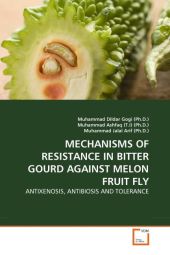 Neuerscheinungen 2010Stand: 2020-01-07 |
Schnellsuche
ISBN/Stichwort/Autor
|
Herderstraße 10
10625 Berlin
Tel.: 030 315 714 16
Fax 030 315 714 14
info@buchspektrum.de |

Muhammad Jalal Arif, Muhammad Ashfaq, Muhammad Dildar Gogi
(Beteiligte)
Mechanisms Of Resistance In Bitter Gourd Against Melon Fruit Fly
Antixenosis, Antibiosis And Tolerance
2010. 196 S.
Verlag/Jahr: VDM VERLAG DR. MÜLLER 2010
ISBN: 3-639-30823-9 (3639308239)
Neue ISBN: 978-3-639-30823-5 (9783639308235)
Preis und Lieferzeit: Bitte klicken
The undertaken project consists of the field and lab experiments which were carried out to investigate the biophysical and biochemical basis of resistance in the fruits of bitter-gourd plant. The field experiments included screening of 13 genotypes of bitter-gourd and tolerance studies. The laboratory experiments included the determination of biophysical and biochemical fruit traits which induce antixenosis and antibiosis in bitter-gourd against melon fruit fly. The fruit-length, fruit diameter, number of ridges/cm2, depth of ribs, pericarp thickness and fruit toughness were found to be most important biophysical fruit traits, which contributed antixenosis in bitter-gourd against melon fruit-fly. Similarly, quantity of ascorbic-acid, chlorophyll (chlorophyll a´, b´ and total chlorophyll), reducing sugars, total sugars, non reducing sugars, nitrogen, protein, phosphorus, potassium, tannin, flavonol, phenols, ash and silica played paramount role in inducing biochemical based antixenosis and antibiosis. The findings of endeavour persuade for the utilization of identified sources of resistance in crop breeding program of bitter-gourd against melon fruit fly.
Dr. M. Dildar Gogi, Asstt. Professor in the Department of Agri. Entomology, Univ. of Agric., Faisalabad, Pakistan, completed Ph.D. in 2009 under the supervision of Dr. Muhammad Ashfaq. He has 25 research papers, 2 projects & 10 M.Sc. students on his credit. His future focus is on induced host-plant-resistance and biorational approaches of IPM.


